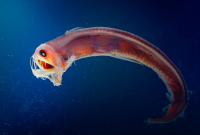Support strong Canadian climate journalism for 2025
This story was originally published by The Guardian and appears here as part of the Climate Desk collaboration.
Nearly a quarter of the world’s freshwater fish are at risk of extinction due to global heating, overfishing and pollution, according to an expert assessment.
From the large-toothed Lake Turkana robber in Kenya to the Mekong giant catfish in Southeast Asia, many of the world’s freshwater fish are at risk of disappearing, the first International Union for Conservation of Nature (IUCN) red list assessment of the category has found.
Nearly a fifth of all threatened freshwater species are affected by climate change, from impacts such as falling water levels, shifting seasons and seawater moving up rivers. Of the assessed species, 3,086 out of 14,898 were at risk of vanishing.
The latest assessment also found that mahogany, Atlantic salmon and green turtles were increasingly threatened, according to scientific assessments, but there was good news about the saiga antelope, which has moved up from the critically endangered category to near threatened after the population increased by 1,100 per cent in just seven years, mainly in Kazakhstan.
“[The] update to the IUCN red list shows the power of co-ordinated local, national and international conservation efforts. Success stories such as that of the scimitar horned oryx show that conservation works. To ensure the results of conservation action are durable, we need to decisively tackle the interlinked climate and biodiversity crises,” said the IUCN president, Razan Al Mubarak.
Big leaf mahogany, among the most commercially sought-after plants on the planet, is now classified as endangered after its numbers fell by 60 per cent over the past 180 years due to unsustainable harvesting. Mahogany wood remains valuable for furniture, musical instruments and decorations, which has driven illegal logging of the tree across Central and South America.
The Atlantic salmon, previously common and classified as a species of least concern, is now near threatened on the IUCN red list after its global population fell by 23 per cent, having vanished from many rivers in the U.K. The fish, which lives in both fresh and saltwater, has been affected by widespread habitat loss, global heating and dams that block access to breeding sites. Breeding with farmed salmon has also weakened their ability to adapt to global heating while invasive Pacific pink salmon is spreading across northern Europe.
“Freshwater fishes make up more than half of the world’s known fish species, an incomprehensible diversity given that freshwater ecosystems comprise only one per cent of aquatic habitat. These diverse species are integral to the ecosystem and vital to its resilience. This is essential to the billions of people who rely upon freshwater ecosystems, and the millions of people who rely on their fisheries,” said Kathy Hughes, co-chair of the IUCN species survival commission freshwater fish specialist group.
“Ensuring freshwater ecosystems are well managed, remain free-flowing with sufficient water, and good water quality is essential to stop species declines and maintain food security, livelihoods and economies in a climate resilient world,” she said.
Central South Pacific and East Pacific green turtles are also at risk of vanishing, according to scientists. They are a major bycatch in industrial and artisanal fishing while their eggs are a delicacy in some countries. Rising global temperatures are also affecting their hatching success and rising sea temperatures are flooding nests.






Comments